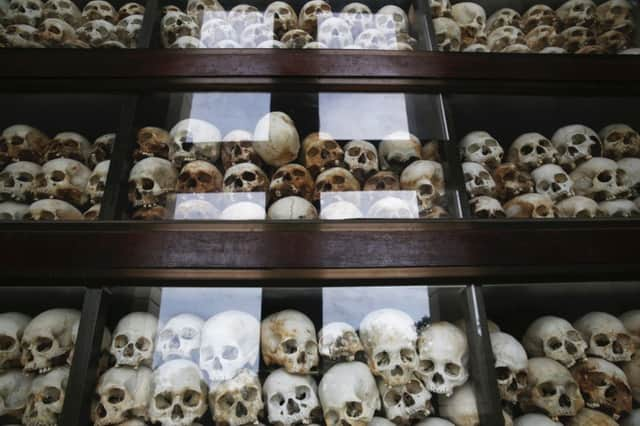Guilty of evil: Men behind Khmer Rouge Killings


Khieu Samphan, an 83-year-old former head of state, and Nuon Chea, leader Pol Pot’s deputy, are the first senior leaders to be held accountable for Khmer Rouge crimes.
The 1975-79 Khmer Rouge regime was a communist movement that tried to build an agrarian “utopia” by emptying cities and forcing residents to work on the land. Two million people died of starvation and overwork or were executed as enemies of the state – more than half of them buried in mass graves called the Killing Fields.
Advertisement
Hide AdAdvertisement
Hide AdAlthough survivors welcomed the life sentences, they said justice has come far too late and was simply not adequate.
“Nothing can compare to the immense suffering they imposed, no sentence can be enough. They belong in hell, not an air-conditioned jail cell,” said Youk Chhang, who heads The Documentation Centre of Cambodia, which has collected more than a million documents related to the Khmer Rouge terror.
“But this gives us hope that we can learn from the past, that we can try to prevent this from ever happening again.”
There was no visible reaction from either of the accused when the decisions were announced. Nuon Chea, wearing dark sunglasses, was too weak even to get up from his wheelchair. Defence lawyers insisted the case was not over and vowed to appeal within 30 days.
Summarising the verdict, chief judge Nil Nonn said the defendants were part of “a joint criminal enterprise” that launched “a widespread and systematic attack against the civilian population” after Khmer Rouge guerrillas seized Phnom Penh on 17 April, 1975.
The attack, Nil Nonn said, included “murder, extermination, enforced disappearances, attacks against human dignity and political persecution”.
The case, which lasted about two years, focused on just one of the Killing Fields and the forced exodus of millions of people from Cambodia’s cities and towns, where even hospitals were emptied of patients.
Most of those who died succumbed to starvation, medical neglect and overwork. Marked for death were the educated, religious or ethnic minorities, Buddhist monks, and anyone suspected of ties with the former government.
Advertisement
Hide AdAdvertisement
Hide AdKhieu Samphan acknowledged mass killings took place but claimed he was just a figurehead with no real authority. He called allegations that he ordered executions a “fairytale”.
Nuon Chea also denied responsibility, saying that Vietnamese forces – not the Khmer Rouge – had killed Cambodians en masse.
The tribunal began in 2006. It has been criticised for spending too much – more than £118 million – and doing too little.
The court has convicted only one other defendant – prison director Kaing Guek Eav, who was sentenced to life imprisonment in 2011. The current trial began in the same year with four senior Khmer Rouge leaders – only two remain. Former foreign minister Ieng Sary died in 2013, while his wife, social affairs minister Ieng Thirith, was deemed unfit to stand trial due to dementia in 2012. Pol Pot, died in 1998 at the age of 73, evading a trial altogether.
Chea Leang, a co-prosecutor, said yesterday’s judgment “will not turn back time, it won’t give back life to those who were executed, or those who died of heat and exhaustion or lack of food or water or medical assistance. Yet I believe it will give some justice, denied to them for so long.”
Survivors of the regime travelled from across the country to witness the historic day. After the verdict was read, former prisoners wept and hugged.